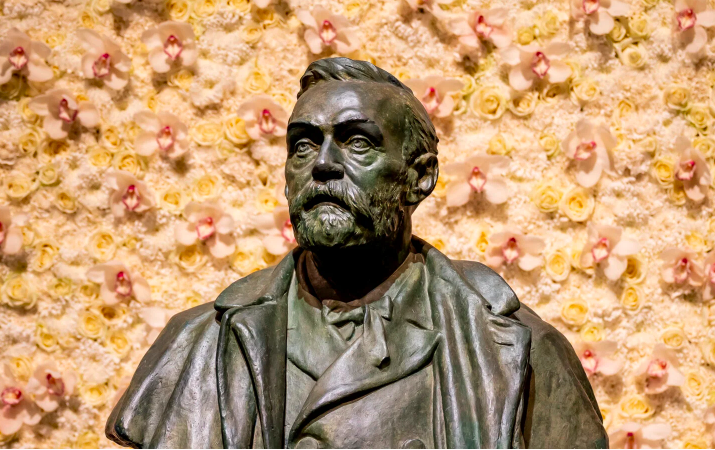The Swedish and Norwegian capitals on Tuesday are hosting Nobel Prize award ceremonies and banquets for laureates and guests.
The day, December 10, is the anniversary of Alfred Nobel death, who passed away in 1896.
The Swedish and Norwegian capitals on Tuesday are hosting Nobel Prize award ceremonies and banquets for laureates and guests.
The day, December 10, is the anniversary of Alfred Nobel death, who passed away in 1896.
All the Nobel Prize winners for 2024 have been announced, including the Nobel Peace Prize to a group of atom bomb survivors in Japan.
The Nobel Prize in Economics 2024
The Economics prize was awarded to three academics, whose research into inequality has shown a link between institutions and prosperity.
British-Americans Simon Johnson and James Robinson and Turkish-American Daron Acemoglu, whose book Power and Progress: Our Thousand-Year Struggle Over Technology and Prosperity was published last year, explored how former colonies’ fortunes had changed.
Societies with a poor rule of law and institutions that exploit the population do not generate growth or change for the better, said the Royal Swedish Academy of Sciences.
“Reducing the vast differences in income between countries is one of our time’s greatest challenges,” said Jakob Svensson, Chair of the Committee for the Prize in Economic Sciences.
The Nobel Peace Prize 2024
Next year will mark 80 years since the Nagasaki and Hiroshima atomic bombs marked the end of World War II, and killed 120,000 people, with thousands more injured.
There are more than 106,000 atomic bomb survivors in Japan today, with an average age of 85.6 years, according to the health ministry.
In 1956, local Hibakusha organizations came together to form the Japan Confederation of A- and H-Bomb Sufferers Organizations, later shortened to Nihon Hidankyo.
The group has issued resolutions and public appeals, and sent annual delegations to bodies such as the UN and peace conferences to advocate for nuclear disarmament.
The Nobel Committee in Norway said the group had demonstrated “through witness testimony that nuclear weapons must never be used again”.
The Nobel Prize in Literature 2024
South Korean author Han Kang, was awarded the prize for literature “for her intense poetic prose that confronts historical traumas and exposes the fragility of human life”.
In 2016, she won the Man Booker International Prize for fiction for The Vegetarian, the first of her novels to be translated into English and considered her major international breakthrough.
The first South Korean and the 18th woman to win the literature prize, Han Kang’s career began in 1993 with the publication of poems and her first work of prose, a short story collection, was published in 1995.
On hearing the news, she told the Swedish Academy: “I’m going to have tea with my son and I’ll celebrate it quietly tonight.”
The Nobel Prize in Physiology or Medicine 2024
Two US scientists, Victor Ambros and Gary Ruvkun, were awarded the Medicine Nobel Prize for discovering a new class of tiny RNA molecules, which play a crucial role in gene regulation.
“Their groundbreaking discovery revealed a completely new principle of gene regulation that turned out to be essential for multicellular organisms, including humans,” the Nobel Assembly said.
In the late 1980s, the pair studied a 1mm long roundworm in the lab of former Nobel laureate Robert Horvitz, but their discoveries on how certain microRNAs in the worm govern the growth of organs and tissue were dismissed at first as being specific to the species, reports Reuters.
Ruvkun’s research group published later work that showed that all animal life had relied on the mechanism for more than 500 million years.
Last year’s Nobel winners in Medicine overcame a major hurdle in the use of messenger RNA (mRNA) technology which was used by BioNTech in the development of an mRNA COVID-19 vaccine with Pfizer.
The Nobel Prize in Chemistry 2024
The three Chemistry laureates were all awarded for their work with proteins – and artificial intelligence (AI).
US scientist David Baker has “succeeded with the almost impossible feat of building entirely new kinds of proteins”.
In 2003, he used the 20 amino acids, known as life’s building blocks, to design a new protein – and since then, his research group has gone on to create new proteins that can be used as pharmaceuticals, vaccines, nanomaterials and tiny sensors.
Google DeepMind CEO Brit Demis Hassabis and US scientist John Jumper, meanwhile, have developed an AI model called AlphaFold2 to predict proteins’ complex structures – something that has baffled scientists for 50 years.
The Nobel Prize in Physics 2024
AI pioneers John Hopfield and Geoffrey Hinton were both awarded the Physics prize, for using tools to develop methods that are the foundation of today’s machine learning.
Widely credited as “a godfather of AI”, British-Canadian Hinton invented a method that can autonomously find properties in data and so perform tasks such as identifying specific elements in pictures.
He has been vocal on the dangers of AI and told the Nobel press conference: “We have no experience of what it’s like to have things smarter than us. It’s going to be wonderful in many respects, in areas like healthcare.
“But we also have to worry about a number of possible bad consequences. Particularly the threat of these things getting out of control.”
Hopfield, a professor emeritus at Princeton University, and at 91, the oldest Physics Nobel laureate ever awarded, created an associative memory that can store and reconstruct images and other types of patterns in data.
The Forum’s AI Governance Alliance is committed to fostering inclusive, ethical, and sustainable AI – and driving significant change across industries.
In October, the Alliance published a white paper, in collaboration with Accenture: Governance in the Age of Generative AI: A 360° Approach for Resilient Policy and Regulation, to address regulatory gaps, stakeholder-specific governance challenges and the evolving demands of this rapidly advancing technology.




















